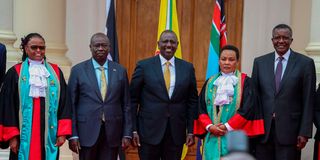Judiciary stands out as biggest beneficiary of Ruto's development agenda

From left: Chief Justice Martha Koome, Deputy President Rigathi Gachagua, President Dr William Ruto, Deputy Chief Justice Philomena Mwilu and former Chief Justice David Maraga during the swearing in of judges at State House Nairobi on September 14, 2022.
The Judiciary continues to stand out as one of the big beneficiaries of President William Ruto’s development agenda as he mobilised lawmakers to support his plan to increase funding to the third arm of government.
Dr Ruto said his administration will increase the Judiciary’s budget by an additional Sh3 billion for the next five years in a bid to make courts financially independent and allow them to resolve disputes within a short time, thus easing the backlog of pending cases.
The expeditious determination of legal disputes is likely to unlock property and money transactions that have been held up in commercial and graft disputes.
Over Sh100 billion is currently at the centre of ongoing corruption cases involving businessmen and current and former government officials.
President Ruto said his administration will respect the rule of law and constitutionally mandated systems of checks and balances.
Describing himself as “a firm believer of democracy and the rule of law”, Dr Ruto said he will seek additional resources to support the scaling up of justice and the expeditious disposal of cases.
“I will be seeking additional resources to support the bottom-up scaling of justice and empower the Judiciary to acquire capacity and develop the infrastructure needed to more efficiently adjudicate and expeditiously conclude corruption and commercial disputes, and all other matters that today are a huge backlog on the Judiciary,” he said when he addressed a joint sitting of the two houses of Parliament.
Delay in determining disputes has been one of the main indictments against the Judiciary as the litigation of some cases take over five years.
Promising to entrench judicial independence, President Ruto observed that the Judiciary is an arm of government, just like Parliament.
“That is why my first executive action when I took office was to undo a legacy of acts and omissions that had incrementally undermined the independence of the Judiciary,” he said.
The Judiciary has over the years suffered budget cuts that saw former Chief Justice David Maraga complain about the crippling effects of the reductions on the operations of the courts.
Fund its operations
In the 2022-2023 budget, the Judiciary was allocated Sh18.9 billion, a Sh1 billion increase from the previous year’s.
This was despite the Judiciary having sought Sh39.56 billion to fund its operations and an additional Sh5 billion for election-related cases.
The President also pledged to increase the number of small claims courts from the current 25 to 100. Small claims courts handle cases valued at less than Sh1 million and were introduced as part of plans to reduce case backlog, which has bogged down the Judiciary over the years.
Dr Ruto also pledged to build high court stations in the seven counties that do not have any, saying the intervention will help speed up the conclusion of cases.
share mobile subscribers database”





